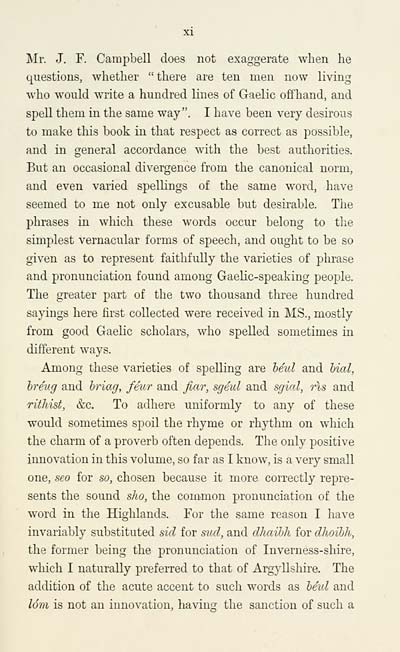Download files
Complete book:
Individual page:
Thumbnail gallery: Grid view | List view

Mv. J. F. Campbell does not exaggerate when he
questions, whether " there are ten men now living
who would write a hundred lines of Gaelic offhand, and
spell them in the same way". I have been very desirous
to make this book in that respect as correct as possible,
and in general accordance with the best authorities.
But an occasional divergence from the canonical norm,
and even varied spellings of the same word, have
seemed to me not only excusable but desirable. The
phrases in which these words occur belong to the
simplest vernacular forms of speech, and ought to be so
given as to represent faithfully the varieties of phrase
and pronunciation found among Gaelic-speaking people.
The greater part of the two thousand three hundred
sayings here first collected were received in MS., mostly
from good Gaelic scholars, who spelled sometimes in
different w^ays.
Among these varieties of spelling are heid and hial,
hreug and briag, feur and jiar, sgeiil and sgial, rls and
rithist, &c. To adhere uniformly to any of these
would sometimes spoil the rhyme or rhythm on w^hich
the charm of a proverb often depends. The only positive
innovation in this volume, so far as I know, is a very small
one, SCO for so, chosen because it more correctly repre-
sents the sound sho, the common pronunciation of the
word in the Highlands. For the same reason I have
invariably substituted sid for siid, and dhaihh for dhoihh,
the former being the pronunciation of Inverness-shire,
which I naturally preferred to that of Argyllshire. The
addition of the acute accent to such words as heid and
loììi is not an innovation, having the sanction of such a
questions, whether " there are ten men now living
who would write a hundred lines of Gaelic offhand, and
spell them in the same way". I have been very desirous
to make this book in that respect as correct as possible,
and in general accordance with the best authorities.
But an occasional divergence from the canonical norm,
and even varied spellings of the same word, have
seemed to me not only excusable but desirable. The
phrases in which these words occur belong to the
simplest vernacular forms of speech, and ought to be so
given as to represent faithfully the varieties of phrase
and pronunciation found among Gaelic-speaking people.
The greater part of the two thousand three hundred
sayings here first collected were received in MS., mostly
from good Gaelic scholars, who spelled sometimes in
different w^ays.
Among these varieties of spelling are heid and hial,
hreug and briag, feur and jiar, sgeiil and sgial, rls and
rithist, &c. To adhere uniformly to any of these
would sometimes spoil the rhyme or rhythm on w^hich
the charm of a proverb often depends. The only positive
innovation in this volume, so far as I know, is a very small
one, SCO for so, chosen because it more correctly repre-
sents the sound sho, the common pronunciation of the
word in the Highlands. For the same reason I have
invariably substituted sid for siid, and dhaihh for dhoihh,
the former being the pronunciation of Inverness-shire,
which I naturally preferred to that of Argyllshire. The
addition of the acute accent to such words as heid and
loììi is not an innovation, having the sanction of such a
Set display mode to: Large image | Transcription
Images and transcriptions on this page, including medium image downloads, may be used under the Creative Commons Attribution 4.0 International Licence unless otherwise stated. ![]()
| Early Gaelic Book Collections > Blair Collection > Collection of Gaelic proverbs and familiar phrases > (15) |
|---|
| Permanent URL | https://digital.nls.uk/76277455 |
|---|
| Description | A selection of books from a collection of more than 500 titles, mostly on religious and literary topics. Also includes some material dealing with other Celtic languages and societies. Collection created towards the end of the 19th century by Lady Evelyn Stewart Murray. |
|---|
| Description | Selected items from five 'Special and Named Printed Collections'. Includes books in Gaelic and other Celtic languages, works about the Gaels, their languages, literature, culture and history. |
|---|

